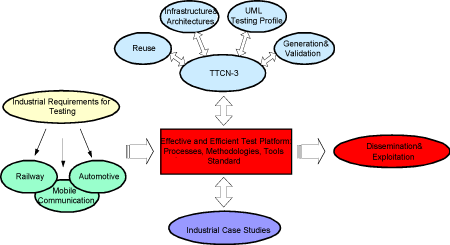|
|||
Three Countries' Offensive towards Testing with Advanced Languagesby Wan Fokkink, Matti Kärki, Jaco van de Pol, Axel Rennoch, Ina Schieferdecker and Markus Sihvonen The need for appropriate means to test systems and software is still alive! Even though a huge number of test tools are on the market, series of conferences on testing continue to be held, and an international standard on testing methodology has existed for more than ten years. Most industries are still looking for ways to make their testing process more effective, efficient and understandable, to strengthen confidence in their products and services. Three European countries, Finland, Germany and the Netherlands, have started a common offensive to establish a basis for the industrial application of tests and testing methodologies with advanced languages. Independent national funding sources have been brought together for the TT-Medal project under the supervision of the Information Technology for European Advancement (ITEA) association. The goal of TT-Medal is to develop a test architecture that covers the whole life cycle of a product, starting from the initial specifications and ending up with regression testing during the maintenance phase. Obviously this goal can only be reached by a testing methodology that addresses tests at both an abstract and an executable level. In TT-Medal key roles are assigned to international standards, the Testing and Test Control Notation (TTCN-3) by ETSI, the Universal Modeling Language (UML2.0) and its testing profile by the OMG. The TT-Medal strategy covers a systematic testing methodology including the production of TTCN-3 based tests from UML models and the development of a generic test infrastructure and test architectures for TTCN-3 with open interfaces for test execution and management. Special emphasis is given to the reuse of test cases between testing phases and for different products in the same domain. Three ERCIM research institutes, CWI, Fraunhofer FOKUS and VTT Electronics, are the driving force behind these innovations. Furthermore, tool support will be developed for automatic test-case generation, validation and deployment, and to support the reuse of test cases. Three tool developers, Conformiq (Fi), NetHawk (Fi) and Testing Technologies (Ge), are responsible for this part of the project. Finally, a complete training package will be developed by Improve QS (NL), and will enable European industries to integrate the new improved test practices into their development processes. The strong application of the standardised and formalised language constructs of TTCN-3 and UML2.0 in mainstream industry provides a special challenge to the customers and providers of test products and services. Coupling the development of system models and tests helps to optimise the rapid implementation of test solutions. Combining the potential of UML2.0, the maturity of TTCN-3 and the advice of industrial manufacturers is an exciting process. The project work is organised into five work packages, which address issues on methodology, test development tools, test execution tools, industrial case studies, and dissemination and standardisation work. There are strong relationships such as major requirements from the industrial cases and theories from methodology that are used as input for the tool-development work packages. Since several partners are actively involved in standardisation work at ETSI and OMG, there is also an exchange of ideas with the originators of TTCN-3 and UML2.0.
The major outcome of the TT-Medal project is an effective and efficient test platform. The platform combines the work of the five different work packages and provides necessary processes, methodologies, tools and standards to improve testing. The effectiveness of the platform is indicated by better product quality, and efficiency ensures that this quality is achieved within a given time frame and resource limits. The TT-Medal project will also show how these new technologies should be used by providing training and organising workshops, as well as demonstrating where and why TT-Medal technologies should be used by gathering industrial experience. The figure summarises the work and the major elements of the TT-Medal project. The TT-Medal project, which runs until end of 2005, may be followed in various ways: participate in our upcoming national and international workshops and exhibitions, visit our project Web site for the latest news and publications, or contact a partner or national representative from the project for further information. Links: Please contact: Matti Kärki, VTT Electronics, Finland Ina Schieferdecker |
|||



